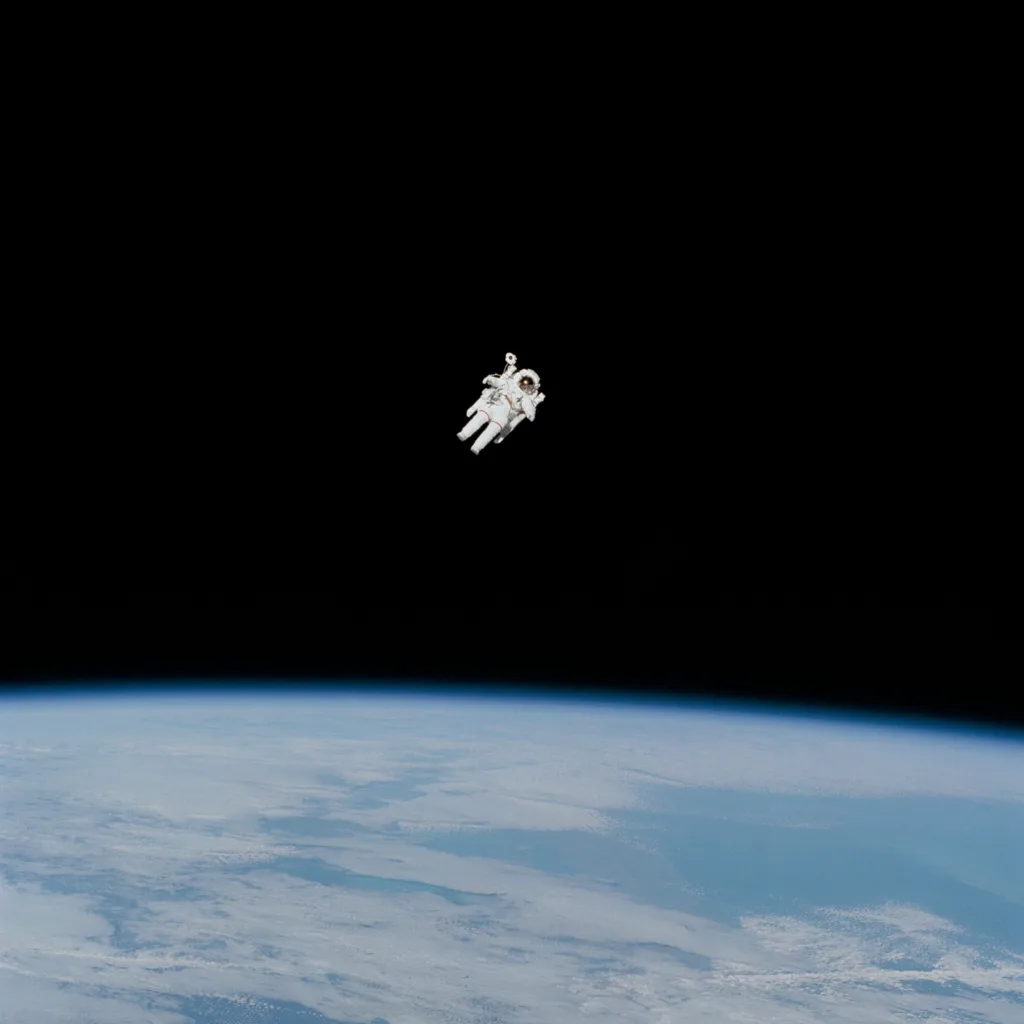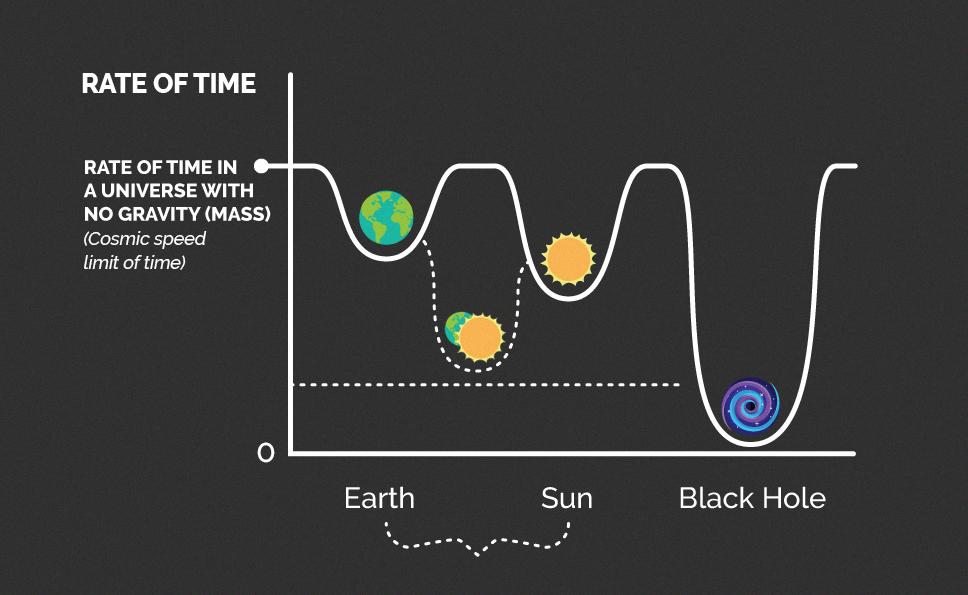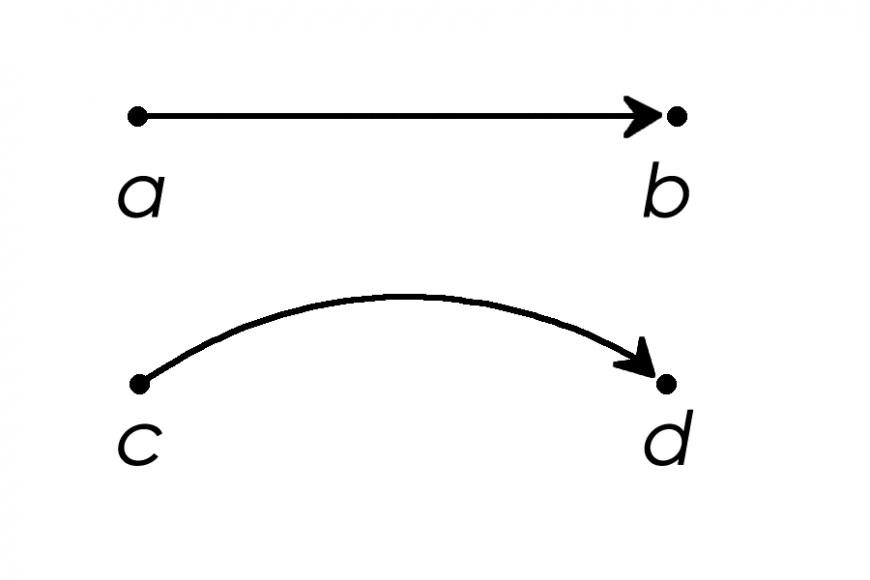Gravity is one of the fundamental forces of the universe that governs the motion of celestial bodies and shapes the structure of galaxies. It is the force that keeps us grounded on the Earth and causes objects to fall towards its center. However, there is more to gravity than just the attractive force between masses. According to Einstein’s theory of general relativity, gravity is the curvature of spacetime caused by the presence of matter and energy. And as it turns out, gravity can also affect the passage of time.
The concept of time dilation is a consequence of Einstein’s theory of relativity, which states that time is not an absolute quantity but is relative to the observer’s motion and the gravitational field in which they are situated. Time dilation occurs when time passes at different rates for two observers who are in relative motion or located in different gravitational fields. Essentially, time slows down in the presence of gravity.
To understand why gravity causes time dilation, we need to delve into the concept of spacetime curvature. According to general relativity, massive objects such as planets and stars warp the fabric of spacetime, causing it to curve around them. The curvature of spacetime is what we perceive as the force of gravity. The closer an object is to a massive body, the stronger the gravitational force and the greater the curvature of spacetime.
Now, spacetime curvature affects the passage of time bcause time and space are intertwined. Just as gravity can bend the trajectory of light, it can also bend the path that time takes. The closer a clock is to a massive object, the slower time passes for that clock relative to a clock that is farther away from the object. This effect is known as gravitational time dilation.
To put it simply, time passes slower in a stronger gravitational field. This means that time passes slower on the surface of the Earth than it does in space. For example, a clock on the International Space Station would run slightly faster than a clock on the surface of the Earth due to the weaker gravitational field.
It is important to note that this effect is only noticeable for extremely precise measurements, as the difference in time dilation is incredibly small. However, it is a real effect that has been observed and measured using atomic clocks. The accuracy of atomic clocks is so high that they can detect the difference in time dilation between two clocks that are only a few centimeters apart.
Gravity does indeed cause time dilation. The closer a clock is to a massive object, the slower time passes for that clock. This effect is a consequence of Einstein’s theory of general relativity, which explains how gravity is the curvature of spacetime. While the effect of gravitational time dilation is incredibly small, it is a real phenomenon that has been observed and measured. Understanding the relationship between gravity and time dilation is crucial to our understanding of the fundamental forces of the universe.
The Effects of Gravity on the Passage of Time
Time goes slower with less gravity. This phenomenon is called time dilation and it is a real effect predicted by Albert Einstein’s theory of general relativity. According to this theory, gravity can bend spacetime, and thereore time itself. The closer a clock is to a source of gravity, the slower time passes for that clock. This means that if we compare two identical clocks, one at sea level and the other at the top of a mountain, the clock at sea level will tick slower than the one on the mountain. Similarly, if we compare two identical clocks, one on the surface of the Earth and the other in space far away from any gravitational sources, the clock in space will tick faster than the one on the surface of the Earth. This effect has been observed and measured through experiments such as the Gravity Probe B mission. Therefore, it is accurate to say that time dilation causes time to go slower with less gravity.

The Impact of Gravity on Time
Gravity can slow time, and the extent to which it does so depends on the strength of the gravitational field. According to the theory of general relativity, time passes more slowly in stronger gravitational fields. This effect is known as time dilation. The difference in the passage of time between two observers in different gravitational fields can be measured in seconds. For example, an observer at the surface of the Earth would experience time passing slightly slower than an observer far away from any gravitational source, with a difference of around 0.0219 seconds per year. However, it’s important to note that this effect is very small and can only be measured with highly precise instruments. Additionally, the effects of other factors such as velocity must also be takn into account when calculating time dilation.
The Effects of Gravity on Aging
Gravity actually makes you age slower, in a relative sense. This is due to the phenomenon of time dilation, where time appears to move slower in stronger gravitational fields. Compared to someone who is not near any massive object, someone who is near a massive object like Earth is aging more slowly by a very small amount. This means that, from the perspective of someone outside of Earth’s gravitational field, time is moving faster for them than it is for someone on Earth. However, this difference is so small that it is not noticeable in everyday life.
Can Gravity Affect the Passage of Time?
According to the theory of relativity, gravity can affect the flow of time. In strong gravitational fields, time appears to slow down from the perspective of an external observer. This phenomenon is known as time dilation. However, it is important to note that the person experiencing the gravitational field will not feel any change in thir own perception of time.
So, in a sense, gravity can “stop time” from the perspective of an external observer. For example, if someone were to observe a clock placed in a strong gravitational field, they would see the clock ticking slower and slower until it eventually appears to stop. However, the person holding the clock would not experience any change in the passage of time.
It is also worth noting that the effects of gravity on time dilation become more pronounced as the strength of the gravitational field increases. So, the stronger the gravitational field, the greater the time dilation effect will be. while gravity can affect the flow of time, it does not completely stop it.
The Effects of Space on Aging
It is true that humans age faster in space due to a variety of factors. It’s estimated that the heart, blood vessels, bones, and muscles deteriorate more than 10 times faster in space than by natural aging. This is beause the human body is adapted to living in Earth’s gravity, and in the absence of it, the body is subjected to conditions that it is not designed for. For instance, the lack of gravity leads to a decrease in the load-bearing activity of our bones and muscles, causing them to weaken and deteriorate at a much faster rate. Additionally, exposure to cosmic radiation in space can lead to cell damage and mutations, which can increase the risk of cancer and other health issues. Therefore, astronauts who spend extended periods in space are likely to experience accelerated aging and may face a higher risk of developing age-related diseases later in life.

The Effects of Space on Aging
Recent scientific studies suggest that astronauts age more slowly on an epigenetic level during long-term simulated space travel than they wold have if they had stayed on Earth. This is because space travel exposes astronauts to a unique environment that affects their bodies in various ways, including changes in their circadian rhythms, exposure to higher levels of radiation, and microgravity conditions. These changes in the space environment have been shown to have an impact on the telomeres, which are the protective caps at the end of chromosomes that shorten as we age. In space, the telomeres of astronauts have been observed to lengthen, indicating that their bodies are undergoing a slower aging process. However, it should be noted that the sample size of astronauts studied for this phenomenon is currently very small, so further research is needed to confirm these findings. Nonetheless, these initial observations provide an exciting glimpse into the potential effects of space travel on human aging.
Can Humans Survive in a High-Gravity Environment?
According to a recent study published on the pre-print server arXiv, it is suggested that the maximum gravitational field humans could survive long-term is four-and-a-half times the gravity on Earth. Therefore, surviving under 2 times the gravity on Earth may be possible for a short period of time, but it is unlikely that humans could sustain such an environment in the long term. Higher gravitational forces can cause numerous health problems, including cardiovascular issues, bone and muscle deterioration, and decreased mobility. Therefore, until more research is conducted, it is advisable to avoid exposure to extremely high gravitational fields.
The Speed of 1g of Gravity
When we refer to the speed of 1g of gravity, we are actually talking about the rate of change in velocity caused by the force of gravity. In other words, an acceleration of 1g means that an object is experiencing a force equivalent to the Earth’s gravity, which is approximately 9.8 meters per scond squared (m/s²).
To put this into perspective, an acceleration of 1g equates to a rate of change in velocity of approximately 35 kilometers per hour (22 mph) for each second that elapses. This means that if an object is falling freely towards the Earth due to gravity, it will gain a velocity of approximately 35 km/hour every second it falls.
It’s important to note that the speed of 1g of gravity can vary depending on the gravitational force acting on the object. For example, on the surface of the Moon, the acceleration due to gravity is only about 0.16g, which means that an object’s rate of change in velocity would be much slower than on Earth.
The speed of 1g of gravity is an important concept in physics and can help us understand the effects of gravity on objects in motion.
Is Gravity Faster Than the Speed of Light?
According to the theory of general relativity proposed by Albert Einstein, the speed of gravity is expected to be exactly the same as the speed of light. This means that gravity should theoretically travel at a speed of 299,792,458 meters per second, which is the speed of light in a vacuum.
However, the actual measurement of the speed of gravity is a complex and challenging task, and scientists have not yet been able to measure it accurately. Some indirect evidence suggests that gravity travels at the speed of light, but no direct measurements have been made to confirm this.
In 2003, two astronomers, Sergei Kopeikin and Edward Fomalont, attempted to measure the speed of gravity by observing the bending of radio waves aroud the sun during a solar eclipse. They concluded that the speed of gravity is between 0.8 and 1.2 times the speed of light, which is fully consistent with the theoretical prediction of general relativity.
Therefore, while we cannot say with absolute certainty that gravity travels at the speed of light, the current scientific evidence suggests that it is very likely that the speed of gravity is indeed equal to the speed of light.

Source: justincollier.com
The Effects of a Gravity-Free Environment on Aging
You would age even if thre was no gravity. Aging is a natural biological process that occurs due to various factors such as genetic makeup, environmental factors, and lifestyle choices. The force of gravity does play a role in aging, but it is not the only factor.
Gravity affects our body in many ways, such as pulling us down towards the Earth, causing stress on our bones and muscles, and affecting our circulatory system. However, even in the absence of gravity, our body would continue to age due to other factors such as exposure to radiation, oxidative stress, and cellular damage.
Moreover, aging is a complex process that involves changes at the molecular, cellular, and systemic levels. It is influenced by a range of factors such as genetics, lifestyle, and environmental factors. Therefore, the absence of gravity would not stop the aging process, but it may slow down some of the physical effects of aging that are caused by gravity.
The Effects of Space on Aging
As per the principle of physics known as time dilation, when an object moves at a high speed, time appears to move slower for that object relative to a stationary observer. This means that the faster an object moves, the slower time appears to pass for it.
In the case of astronauts on the International Space Station (ISS), they are moving at a speed of approximately 28,000 km/h. This means that time appears to move slower for them relative to someone on Earth. As a result, their biological processes are also slowed down, including the aging process.
So, while in space, astronauts may not age at the same rate as people on Earth. However, the difference is so small that it is not noticeable in a short space of time. For instance, after a six-month mission on the ISS, the returning astronauts would be just a fraction of a second younger than they would have been if they had stayed on Earth.
The reason why astronauts don’t age in space is due to the principle of time dilation, which cuses time to move slower for objects that are moving at high speeds.
Does Time Exist in Outer Space?
Time exists in space. Time is a fundamental property of the Universe, and it is intimately connected to the fabric of space itself. In fact, the concept of space-time, which treats space and time as two aspects of a single entity, is a central concept in modern physics. The laws of physics, including the theory of relativity, depend on the existence of time and space-time. Therefore, it is safe to say that time exists in space, and it plays a crucial role in our understanding of the Universe.
Stopping Time: Is It Possible?
Stopping time is a concept that is often seen in science fiction, but it is not possible in reality as we know it. According to the theory of relativity, time is a fundamental aspect of the universe that is always moving forward, and it cannot be stopped or reversed.
The closest thing we have to stopping time is throgh the use of high-speed travel. As an object approaches the speed of light, time dilation occurs, which means that time appears to slow down for the object relative to an outside observer. However, this effect is very small until the object is traveling at a significant fraction of the speed of light, and it is still not a complete stoppage of time.
Another theoretical concept that is often associated with time stopping is the idea of a black hole. In the vicinity of a black hole, the gravitational force is so strong that it warps space-time to the point where time appears to stop. However, this effect only occurs within the event horizon of the black hole, and it is not something that can be harnessed or controlled.
While stopping time may be a fascinating idea in science fiction, it is not something that can be achieved in reality. Time is a fundamental aspect of the universe that is always moving forward, and it cannot be stopped or reversed.

Source: thescienceexplorer.com
Reversing Time: Is It Possible?
In a natural environment, time-reversibility is exponentially improbable. This means that it is highly unlikely that time can be reversed in a natural setting. However, physicists have discovered that it is possible to artificially reverse the time arrow to a known or given state within an IBM quantum computer. This is achieved usng a specially designed algorithm that can manipulate the quantum states of the computer’s qubits. It is important to note that this process is limited to the artificial environment of a quantum computer and does not apply to the natural world. Therefore, while it may be possible to reverse time within a quantum computer, it is not currently feasible to do so in the real world.
The Possibility of Freezing Time
It is not possible to freeze time. Time is a fundamental aspect of our reality and cannot be stopped or frozen any more than we can stop or freeze depth or width. Time is constantly moving forward, and everything in our universe is subject to its effects.
While some may argue that time can be slowed down through the effects of relativity, this does not equate to freezing time. Time dilation occurs when an object is moving at high speeds or in high gravitational fields, causing time to appear to move slower for that object relative to a stationary observer. However, this effect is relative and dependent on the observer’s position and motion, and does not actually stop or freeze time.
Practical time dilation, such as that depicted in science fiction, would require an enormous amount of energy and complex engineering that is crrently beyond our technological capabilities. Therefore, freezing time remains a concept limited to our imaginations and not a possibility in reality.
Conclusion
Gravity is a fundamental force that governs the behavior of matter in the universe. It is responsible for the formation of planets, stars, and galaxies, and plays a crucial role in determining their motions and interactions. The effects of gravity can be observed in everyday life, from the dropping of objects to the tides in the ocean. The theory of general relativity has shown that gravity is not just a force, but also an effect of the curvature of spacetime caused by the presence of mass and energy. This has led to a deeper understanding of the nature of gravity and its effects on time and space. Through ongoing research and exploration, we continue to discover new insights into the workings of this powerful force and its role in shaping our universe.
